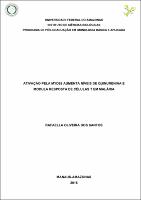| ???jsp.display-item.social.title??? |


|
Please use this identifier to cite or link to this item:
https://tede.ufam.edu.br/handle/tede/7539| ???metadata.dc.type???: | Dissertação |
| Title: | Ativação pela MYD88 aumenta níveis de quinurenina e modula resposta de células T em malária |
| ???metadata.dc.creator???: | Santos, Rafaella Oliveira dos  |
| ???metadata.dc.contributor.advisor1???: | Lalwani, Pritesh Jaychand |
| ???metadata.dc.contributor.referee1???: | Nogueira, Paulo Afonso |
| ???metadata.dc.contributor.referee2???: | Bozza, Marcelo Torres |
| ???metadata.dc.description.resumo???: | A malária ainda representa um problema de saúde pública mundial. No Brasil mais de 90% dos casos são causados por Plasmodium vivax. Estudos demonstraram um aumento nos níveis de IL-10 e de células T reguladoras em infecções por Plasmodium, em humanos e camundongos. No entanto os mecanismos que levam a este aumento são pouco estudados. Em vista disso, nosso objetivo teve como entender o papel da resposta imune inata e os fatores que levam a este aumento. Nossos resultados mostraram um elevado nível de quinurenina (KYU), medida através do HPLC, em pacientes infectados por P.vivax (Pv), sendo acompanhado com um aumento de citocinas IL-6, IL-10 e IFN-y quantificados por CBA. In vitro a estimulação de PBMCs por extrato de eritrocitos infectados por Pv, elevou os níveis de quinurenina e citocinas IL-2, IL-6, IL-10, TNF-a e IFN-y no sobrenadante, aumentando também a expressão da enzima indoleamina 2,3-dioxigenase (IDO-1) em células CD14*. Além disso, nós observamos através da citometria de fluxo uma redução na ativação de células Te aumento de células T reguladoras CD4 CD25* FoxP3 CD127 estimuladas por Pv. O aumento da quinurenina pode ser bloqueado por adição de inibidores da IDO e MyD88. Bloqueando IDO e MyD88 nós conseguimos mostrar que após a inibição houve uma redução de quinurenina, citocinas, células Tregs e um aumento de células T ativadas. Em conclusão, nossos dados mostram pela primeira vez que o aumento da quinurenina induzido por IDO, leva a uma maior frequência de células T regs CD4+CD25+ FoxP3 CD127 e uma redução na ativação de células T efetoras. |
| Abstract: | Malaria remains one of the world's worst health problems. In Brazil more than 90% of the infections are caused by Plasmodium vivax. Recent evidence demonstrates an increase in IL-10 and T regulatory cells (Tregs, CD4+CD25+CD127-Foxp3+) in Plasmodium infections in humans and mice. However, the mechanisms that lead to this increase are poorly understood. In view of this, our goal was to understand the role of the innate immune response and the factors that lead to increase in Tregs. We observed elevated level of kynurenine (KYU) and indoleamine 2,3-dioxygenase (IDO) activity, measured by HPLC and an increase in IL-6, IL-10 and IFN-y quantified by CBA in patients infected with P. Vivax. In vitro stimulation of PBMCs by extract of P.vivax infected-erythrocytes (Pv) increased IDO-1 expression in CD14+ cells that was accompanied by an increase in kynurenine and, cytokines IL-6, IL-10, TNF-a and IFN-y. In addition, we observed by flow cytometry a reduction in the activation of T cells and an increase in frequency of Tregs upon Pv stimulation. The increase of kynurenine was blocked by addition of IDO and MyD88 inhibitors. Blocking IDO and MyD88, we also observed a reduction in kynurenine, cytokines and Treg cells and an increase in activated CD4+T cells. In conclusion, we demonstrate for the first time that increased IDO activity increases frequency of Tregs, which suppresses T effector cell response in malaria. |
| Keywords: | Malária Linfócitos Proteínas |
| ???metadata.dc.subject.cnpq???: | CIÊNCIAS BIOLÓGICAS: IMUNOLOGIA |
| ???metadata.dc.subject.user???: | Malária Células T reguladoras Triptofano Quinurenina Indoleamina 2,3 – dioxigenase MyD88 |
| Language: | por |
| ???metadata.dc.publisher.country???: | Brasil |
| Publisher: | Universidade Federal do Amazonas |
| ???metadata.dc.publisher.initials???: | UFAM |
| ???metadata.dc.publisher.department???: | Instituto de Ciências Biológicas |
| ???metadata.dc.publisher.program???: | Programa de Pós-graduação em Imunologia Básica e Aplicada |
| Citation: | SANTOS, Rafaella Oliveira dos. Ativação pela MYD88 aumenta níveis de quinurenina e modula resposta de células T em malária. 2016. 89 f. Dissertação (Mestrado em Imunologia Básica e Aplicada) - Universidade Federal do Amazonas, Manaus, 2016. |
| ???metadata.dc.rights???: | Acesso Aberto |
| ???metadata.dc.rights.uri???: | http://creativecommons.org/licenses/by-nc-nd/4.0/ |
| URI: | https://tede.ufam.edu.br/handle/tede/7539 |
| Issue Date: | 29-Sep-2016 |
| Appears in Collections: | Mestrado em Imunologia Básica e Aplicada |
Files in This Item:
| File | Description | Size | Format | |
|---|---|---|---|---|
| Dissertação_RafaellaSantos_PPGIBA.pdf | 5.37 MB | Adobe PDF |  Download/Open Preview |
This item is licensed under a Creative Commons License





